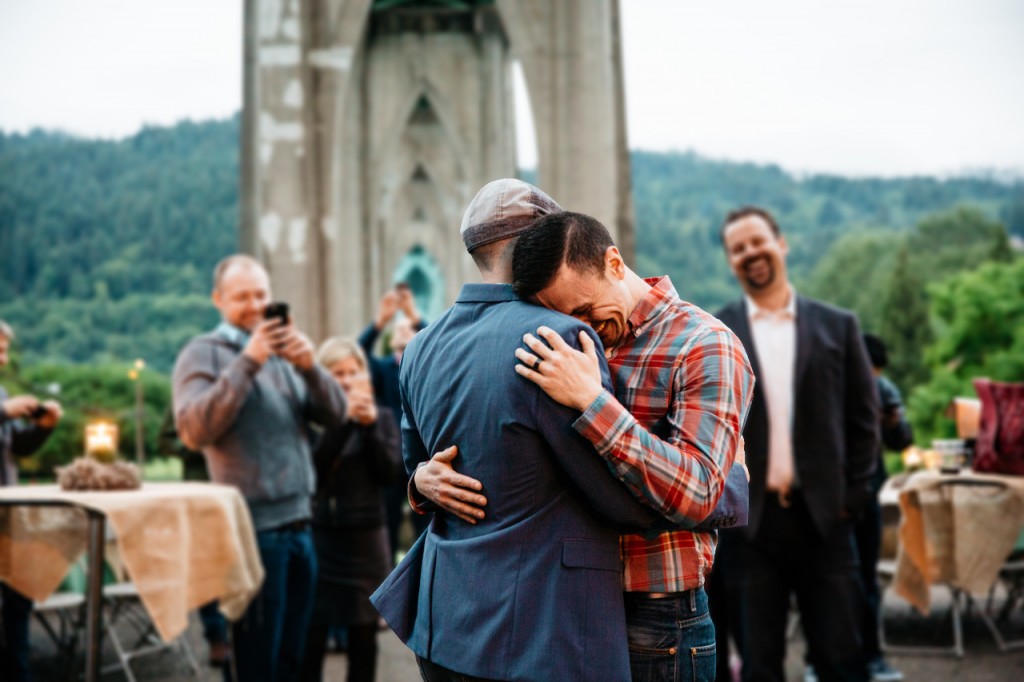If you’re new to our blog you may not know that we’re still newlyweds. We’ve only been married five months. We started blogging soon after we got engaged because when we looked for resources to navigate these waters of faith, sexuality, and marriage, we found there weren’t many. There’s no shortage of advice for Christian couples, but almost all of it comes from a gender complementarity perspective—the role of a wife, the duty of a husband—and that makes it inapplicable to a same-sex relationship. There’s also, these days, a lot of material available for same-sex couples—but almost none of it is faith-based.
 We don’t pretend to be experts, and we certainly don’t have all the answers. In many ways we’re figuring this out as we go along, and we’re trying to learn from the marriages and couples we admire—whether they’re gay or straight, Christian or otherwise. We write because we’ve come to realize that the onus is on our generation to be the role models we didn’t have when we were younger—and because, despite any mistakes we’re sure to make, we want the broader church and the world to see at least one way in which Christ-centered same-sex marriage can be done.
We don’t pretend to be experts, and we certainly don’t have all the answers. In many ways we’re figuring this out as we go along, and we’re trying to learn from the marriages and couples we admire—whether they’re gay or straight, Christian or otherwise. We write because we’ve come to realize that the onus is on our generation to be the role models we didn’t have when we were younger—and because, despite any mistakes we’re sure to make, we want the broader church and the world to see at least one way in which Christ-centered same-sex marriage can be done.
So what are some things we’ve learned about marriage in such a short period? Is love really patient, and truly kind? Yes… But the same can’t always be said of us. We fumble, we apologize, and we try again. But we’re learning. Here’s one lesson learned for each month we’ve been married:
You need community
When we started dating we were both part of the same small group at church. Getting to know each other in that intimate, Spirit-filled setting allowed us to be vulnerable. But perhaps most important, it affirmed the strength we perceived in our connection. When we told our small group that we’d decided to date, the news was met with warmth. The church we were attending back then is not affirming, and some of our friends expressed concern about our decision. Those conversations helped us work through our own theological questions. But we were encouraged by the fact that even those whose understanding of scripture kept them from fully encouraging us to date saw the ways in which we were good for each other.
By the time we got engaged we had moved to a new city, and God had led us to a church that was undergoing a change in its views of same-sex marriage. There, we found something we never dreamed was possible: A Christ-centered, outrageously loving community that is not afraid to sit at peace with the tension and mysteries of our faith. This church has seen us, for the first time, become fully integrated: unapologetically Christian and unashamed of the nature bestowed on us. Our wedding was as a celebration of this community. (There’s a recap of the day here.) The love, advice, prayers, and encouragement we’ve received from our church are helping us build this house we call marriage on a solid foundation.
We’re not that different
A common objection to same-sex marriage is that a relationship between two men or two women is fundamentally different from that of an opposite-sex couple. This is based on the notion of gender complementarity: the belief that men and women have been assigned specific roles by nature, and that a marriage can only be successful and God-pleasing when each gender is doing its designated part. Most Christians believe this view of marriage is supported by scripture, but this understanding of gender sounds more like what we read in Plato than what we see in the Bible itself. (If you have 40 minutes, listen to this excellent lecture on gender complementarity by Bible scholar James Brownson.)
What we’ve learned is that, in practice, our marriage is not very different from other couples we know. Most modern marriages are egalitarian—even among people who pay lip service to the notion of gender roles. The result is that our domestic life, our problems, and our fights, look remarkably similar to those of everyone else.
Love languages matter
We have almost opposite love languages. This has been an ongoing source of friction in our marriage. David feels most loved through acts of service. Constantino appreciates them, but he doesn’t always associate them with love. He feels most loved in the midst of a long philosophical conversation and when hearing or telling stories. David, an author, associates telling stories with work, and doesn’t much care for long, “pointless” conversations. Constantino grew up with servants and though he hasn’t had any for almost two decades, doing chores still doesn’t come naturally to him.
A lesson learned the hard way is that you must show love to your spouse using his or her love language—not yours. Constantino may tell David he loves him all day long, and send him dozens of articles for them to discuss, but if he doesn’t take out the trash, David won’t feel very loved. David may bring Constantino a cup of coffee every morning, but if he doesn’t sit and give him five minutes of chit chat, he won’t really feel the love.
Loving your spouse is work, and half-assed jobs are not allowed: If Constantino starts a long conversation while doing the dishes, his act of service becomes work for David, and if David rushes him through a story, or is constantly looking at the clock while they talk, Constantino will feel like an imposition. The good news is, once you become fluent in your spouse’s love language you’ll see that the work is worth it. Seeing your spouse happy fills your heart with a joy that is hard to describe. “Happy wife, happy life.” (And by “wife” we mean spouse of any gender.)
Talk about money before you get hitched
We started talking openly about our finances long before we even got engaged. The catalyst was a season of underemployment for Constantino early on in our relationship that forced him to disclose his financial situation to David. We looked into each other’s bank statements before we looked into each other’s pants—and it made us feel more naked than if we had given each other a striptease. It was stressful, unpleasant, and the least sexy thing you could ever imagine. We argued and stressed more about our finances when we were just dating than we have since we got engaged. We spent countless hours talking about how we each handle money, and as a result there have been no surprises and really no fights about money now that we’re married.
We’re on the same page now when it comes to finances, and talking about it comes natural. We still have a monthly financial meeting to go over our budget, and we don’t intend to ever put this aspect of our marriage on auto pilot, but we do feel grateful that financial arguments—one of the strongest predictors of divorce—haven’t been a thing in our marriage so far. In hindsight, all those awkward conversations when we were dating were a blessing.
Grace is a relationship’s duct tape and WD-40
There’s a handyman joke that says all you need for any problem is duct tape and WD-40. Does it move when it shouldn’t? Use duct tape. Does it not move when it should? Use WD-40. We’ve found grace to be a similar panacea for most things that aggravate a relationship.
Around any house or apartment, there are often lots of little things to fix: a squeaky door, a leaky faucet, a loose cabinet knob. Likewise, every person brings to a relationship the squeaky, leaky parts of themselves—the aspects of us that are broken and, no matter how often we repair them, always seem to come undone again. These were things we zeroed in on as problems when we started sharing a home: for example, the way someone did chores, or the way someone handled a social situation.
Five months into our life together, we’re learning that these things aren’t all that important. There are traits in both of us that are annoying or problematic, but they don’t threaten the stability of the home. They aren’t a caved-in roof or a sinking foundation. And so in these instances, we’ve learned to voice our feelings and opinions, and then let go. Rather than trying to change the other person, we’re learning to love and accept both the good and the bad in each other because even the objectionable parts are, after all, intrinsic components of the full person we’ve chosen to love. And a little bit of grace given out comes back to you in spades.
Like our Facebook page and follow us on Twitter for more.
Photo by Lehua Noelle.












